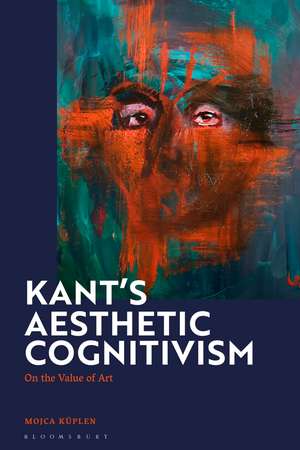Kant's Aesthetic Cognitivism: On the Value of Art
Autor Mojca Kuplenen Limba Engleză Hardback – 12 iul 2023
Preț: 509.76 lei
Preț vechi: 730.81 lei
-30% Nou
Puncte Express: 765
Preț estimativ în valută:
97.61€ • 100.69$ • 80.90£
97.61€ • 100.69$ • 80.90£
Carte tipărită la comandă
Livrare economică 20 februarie-06 martie
Preluare comenzi: 021 569.72.76
Specificații
ISBN-13: 9781350289512
ISBN-10: 1350289515
Pagini: 208
Dimensiuni: 156 x 234 x 19 mm
Greutate: 0.47 kg
Editura: Bloomsbury Publishing
Colecția Bloomsbury Academic
Locul publicării:London, United Kingdom
ISBN-10: 1350289515
Pagini: 208
Dimensiuni: 156 x 234 x 19 mm
Greutate: 0.47 kg
Editura: Bloomsbury Publishing
Colecția Bloomsbury Academic
Locul publicării:London, United Kingdom
Caracteristici
Shows how artworks can promote understanding of abstract concepts and therapeutic self-knowledge
Notă biografică
Mojca Kuplen is an alumni of the Department of Philosophy, Central European University, Austria. She specializes in Kant's philosophy, philosophy of art and aesthetics. She is the author of Beauty, Ugliness and the Free Play of Imagination.
Cuprins
Abbreviations of Kant's WorksIntroduction1. Aesthetic Cognitivism in the Arts2. Kant and Art as Expression of Aesthetic Ideas3. Artistic Expression of Aesthetic Ideas and Therapeutic Self-knowledge4. Cognitive Value of Representational and Non-representational Art5. The Aesthetic Thesis of Kant's Cognitivism6. Kant and Aesthetic CognitionConclusion NotesBibliographyIndex
Recenzii
In this superb book, Kuplen offers an original interpretation of Kant that opens up a new way of thinking about the forms of worldly insight that art can offer. Kuplen's model demonstrates that art's claim to cognitive value lies in its ability to reveal features of the world in ways that cannot be grasped through the exercising of ordinary forms of cognition. Kuplen's case for this is smart, clear, and of broad relevance. Kant's Aesthetic Cognitivism is a major achievement.
A thorough treatment of Kant's understanding of artworks as expressions of aesthetic ideas is long overdue. Kuplen provides such an account, arguing that art enhances our holistic understanding of abstract concepts and ideas by leveraging the emotional and affective responses they elicit. Doing so, moreover, occasions aesthetic pleasure in art, suggesting an intimate connection between cognitive and aesthetic value at the core of Kant's "aesthetic cognitivism." Timely, and fully developed, Kuplen's account is sure to further debate.
A thorough treatment of Kant's understanding of artworks as expressions of aesthetic ideas is long overdue. Kuplen provides such an account, arguing that art enhances our holistic understanding of abstract concepts and ideas by leveraging the emotional and affective responses they elicit. Doing so, moreover, occasions aesthetic pleasure in art, suggesting an intimate connection between cognitive and aesthetic value at the core of Kant's "aesthetic cognitivism." Timely, and fully developed, Kuplen's account is sure to further debate.
